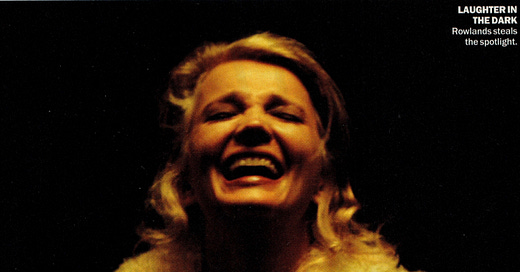Gena Rowlands speaks about the anxieties of Influence
Though she’d been on TV, Broadway and the big screen for nearly two decades prior to its release, Gena Rowlands solidified her stature as an acting grande dame in 1974 with the independent feature A Woman Under the Influence, written and directed by her late husband, John Cassavetes. As Mabel Longhetti—a mentally disturbed housewife who is reluctantly institutionalized by her blue-collar spouse, Nick (Peter Falk)—she bugs her eyes and tongue-clucks her way through incredibly discomfiting sequences of distress. It’s a rawly exposed performance that never once feels emotionally untrue, and Rowlands, now 79, received a much-deserved Oscar nod for her efforts. We spoke on the occasion of the Museum of Modern Art’s weeklong run of a restored print of the film.
A Woman Under the Influence began life as a play, correct?
Yes. John put the play in my lap and said, “Tell me what you think.” I read it and I was knocked out by it, though I said, “I’m not sure I could do it every night.” So he said, “All right, I’ll do it as a movie.” It’s a great mystery to me where it came from. John didn’t share with you when he was working. He liked to surprise you.
For a while, there was a mostly erroneous belief among critics and audiences that Cassavetes’s films were entirely improvised. Did improvisation play any role in this film’s creation?
A Woman Under the Influence was thoroughly scripted. Yet John was very committed to his actors working independently. When we first started, there was something I didn’t quite understand, and I asked him about it. He said, “Gena. I wrote it. I gave it to you. You accepted it. By this time you should know more about this character than anybody in the world. Now you tell me.” We were allowed this enormous freedom. And really, the screenplay itself was so good. It was a tight screenplay, yet everyone was acting so freely. I think the tension that resulted created some very sad and some very funny moments, like when Mabel’s husband takes their children to the beach. So masterful.
Did you attempt to ground Mabel Longhetti in a particular time period?
I don’t think Mabel really has a time. She’s an independent eccentric. She certainly doesn’t relate to her parents, though she loves them. And she just adores her husband. Any possible year, any possible century, she just could not live without his love. And I think he loved her too.
A lot of your strongest roles were with Cassavetes, though you’ve done terrific work with filmmakers like Woody Allen in Another Woman and performers like Bette Davis in Strangers: The Story of a Mother and Daughter.
I loved doing those movies. I think the things John did were really quite superior to most everything. He didn’t belong to any set group. He just did what he wanted to, though he was in no way antagonistic to other films. We loved films. We saw everything. Both of us worked in other people’s films. That was one of the advantages that we had: Because John and I had been acting quite a few years before he took up directing, if we ran out of money—which we frequently did—we could do some other person’s movie and bring the earnings into our own projects. It’s a tough way of doing it, but we didn’t even think about the strain. We never had to stop doing.
Which leads me to wonder, what have you been doing lately?
I’m obviously at the end of my career. I can’t race those kids down the street. It’s an age when everybody’s interested in comic books and aliens and vampires and such, so that doesn’t really call to me. But there have been some nice parts that have turned up. Like the one I did with my son Nick—The Notebook. I loved working with Jim Garner, whom I’ve known for all these many years.
What do you hope today’s audiences will get out of A Woman Under the Influence?
I don’t know what people will get out of it now. It’s a long time ago—1974. That was a very good period for women’s roles, and John had a great sympathy for women. His feeling was that the world is set up to drive women crazy. And that was half jest, but his heart was behind it. Things have changed a lot. The young women have some good parts too now, though people are worried about different things. But they’re more open to certain things too. I’m interested to see how they relate.
A Woman Under the Influence screens Sat 24–Fri 30 at MoMA.




